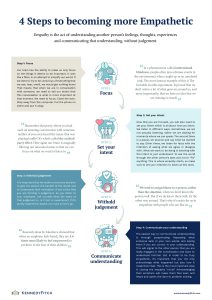Empathy, a misunderstood yet important aspect of inclusive leadership
 The past months have been trying, for everyone. In different ways, for each of us. But I would like to give a special shout out to the leaders out there, who have gone and are going through a leadership test like no other.
The past months have been trying, for everyone. In different ways, for each of us. But I would like to give a special shout out to the leaders out there, who have gone and are going through a leadership test like no other.
For many of you, this is your first full-on crisis. Even if you experienced the 2008 Financial crisis or the ups and downs of the VUCA world, nothing could have prepared you for this. Covid-19 is VUCA on steroids and nobody saw it coming (ok, except for Bill Gates). You have had to support your employees whose homes turned into offices and classrooms overnight, who fell ill or had loved ones falling ill, or whom you have had to let go through no fault of their own. And in the midst of this, you have had to plan and move ahead, even though at times you didn’t know what tomorrow would look like let alone next month. And look after yourself. That cannot have been easy, but I have no doubt that you have given it your all and for that I applaud you.
Undoubtedly, you will be counting the days until your summer vacation. Even if it will be in the form of a tent pitched in the backyard, a few homemade smoothies with colorful umbrellas and a paddling pool. Home is where the heart is, they say. Often, vacation time is a moment of reflection and setting of new intentions. In that spirit, I’d like to offer you some food for thought, some that might help you in your leadership journey. And the topic is Empathy – a misunderstood (pun intended) yet important aspect of inclusive leadership.
What Empathy is and what it’s not
The most comprehensive explanation of what Empathy is, is in my view: The act of understanding another person’s feelings/thoughts/experiences and communicating that understanding, without judgement.
It’s a term often confused with other concepts so let me also set out what it is not. Empathy is not sympathy. Empathy is about understanding the other person’s feelings, sympathy is when you feel the other person’s feelings. If you are sympathetic to someone, then it will be more difficult to be independent and support the other person in dealing with the situation. Empathy is also not about trying to fix the other person’s problem for them, which is compassion. Lastly, Empathy is also not equal to endorsement. Just because you empathize with someone, it does not mean that you support his or her subsequent actions. Empathy is purely about understanding and communicating that understanding.
How Empathy can help me as a leader
By growing your empathetic ability, you can make better decisions, stimulate a culture of openness and empower your teams. And it will give you energy, instead of consuming it.
We’ve all been there – something goes wrong at work, you get frustrated and, unable to see the forest for the trees, you go to your manager to find a solution. Only to find that they don’t really listen to you – they are checking their email whilst you are talking and then start to give you solutions before you have even finished speaking. You leave the conversation feeling equally, if not more, frustrated and not really bought into the solution. Your manager has now created a disconnect with you and decreased the chances that you will go to them with issues in the future. But they are probably thinking – problem solved. Not ideal, right?
But I am also sure that you can remember the time someone did listen intently. You could feel that they were fully focused on what you had to say, taking the time to understand the whole situation before responding. You felt heard and so much better afterwards, lighter. And maybe you had even figured out the solution yourself, just by hearing yourself talk. We often forget the immense power there is in listening, in making someone feel heard and seen. But that’s exactly what Empathy is about.
In many ways it’s like being a coach. As a coach, your role is not to provide answers. Your role is to ask the right questions that will allow the coachee find his or her own answers. We do this because a) we believe that everyone is capable of answering their own questions with the right help and b) we know that people are more likely to accept an answer they have come up with than one given to them by someone else. Not only will they be more likely to act upon the ideas they have generated, they will also feel more empowered to do so. And is that not ultimately what you want as a leader, to have a team that feels empowered and trusted, with a culture of open communication?
Why we struggle with Empathy in the workplace
I think part of the reason why we struggle with Empathy in the workplace is a simple misunderstanding of what it is. But part of it is also down to culture. Edgar Schein, in his book “Humble Inquiry”, argues that we have created a leadership culture of “do & tell”. That we have been primed to think that the role of leaders is to give answers and not ask questions. His theory is that it’s connected to power – if I tell you what you should do, it implies that you don’t have this knowledge and therefore I have an advantage over you. And if it’s not all about power, then it’s at least about not wanting to be perceived as not knowing.
This might have worked in the past, but in today’s world of work, which is networked, collaborative and continuously changing, I simply cannot see how this could be a sustainable leadership approach anymore. It is near impossible to have all the answers, all the time. Don’t get me wrong. I understand that much of this is situational – at times you will indeed be the one with the answers. I would be willing to bet, however, that it’s not as often as you think.
Empathy requires someone to enter into a conversation with the mindset of “I don’t know what I don’t know, but I am curious to find out!”. And that takes guts, especially as a leader. You essentially have to make yourself vulnerable in front of a co-worker. But it is exactly that combination of curiosity and humility that will create trust between two people and trust is a critical element of a good (working) relationship.
How do I become more empathetic?
The good news is that, unless you belong to the 1% of the population that is unable to feel Empathy, you already have the ability to be empathetic built in. At the age of two, we are already laying the foundations for this skill as little human beings. It’s why a toddler will cry when it sees another child cry. Slightly annoying for parents, but good practice for kids. So we all have the foundations within us.
In the attached document, I have outlined a few small, simple things you can do to build your “Empathy muscles”. An easy read as you drink that smoothie with your feet in the paddling pool! Give it a try – you might not get it right immediately but like with any muscle, it takes practice to build it. And in the meantime, enjoy your well-deserved time off and don’t forget to celebrate all that you have achieved in these past months.




